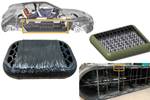BMW, Toyota to launch FCEV with composite H2 tanks in 2028
Global automotive manufacturers are preparing for series production of FCEV passenger vehicle option based on jointly developed powertrain technology.
Share
Read Next
BMW Group (Munich, Germany), alongside Toyota Motor Corp. (Tokyo, Japan), plans to launch its first-ever series production fuel cell electric vehicle (FCEV) in 2028, offering customers an additional all-electric powertrain option with zero local emissions. Like the iX series, BMW confirmed that the FCEV will be using composite pressure vessels for hydrogen storage.
Both companies are driven to advance hydrogen fuel cell technology. “This is a milestone in automotive history: a series production fuel cell vehicle to be offered by a global premium manufacturer. Powered by hydrogen and driven by the spirit of our cooperation, it will underscore how technological progress is shaping future mobility,” says Oliver Zipse, chairman of the board of management at BMW AG. “And it will herald an era of significant demand for FCEVs.”
According to Koji Sato, Toyota’s president and member of the board of management (representative director), the company shares the “same passion [as BMW] for cars and a belief in ‘technology openness’ and a ‘multi-pathway’ approach to carbon neutrality.”
Together, BMW and Toyota aim to jointly develop the powertrain system for passenger vehicles, with the core fuel cell technology (the individual third-generation fuel cells) creating synergies for commercial and passenger vehicle applications. The result of this collaborative effort will be used in individual models from both BMW and Toyota and will expand the range of FCEV options available to customers. Customers can expect the BMW and Toyota FCEV models to maintain their distinct brand identities and characteristics, providing them with individual FCEV options to choose from.
This development comes not long after successful testing of the BMW iX5 hydrogen pilot fleet worldwide. The new series production models will be integrated into BMW’s existing portfolio, i.e. BMW will offer an existing model in an additional hydrogen fuel cell drive system variant. As FCEV technology is another electric vehicle technology, the BMW Group explicitly views it as complementing the drive technology used by battery electric vehicles (BEV) and next to plug-in hybrid electric vehicles (PHEV) and internal combustion engines (ICE).
The pathway to realizing the full potential of hydrogen mobility includes its use in commercial vehicles and the establishment of refueling infrastructure for all mobility applications, including hydrogen-powered passenger vehicles. Recognizing the complementary nature of these technologies, the BMW Group and Toyota are also supporting the expansion of hydrogen refueling and BEV charging infrastructure. Both companies are encouraging sustainable hydrogen supply by creating demand, working closely with companies that are building low-carbon hydrogen production, distribution and refueling facilities.
Related Content
-
Recycling hydrogen tanks to produce automotive structural components
Voith Composites and partners develop recycling solutions for hydrogen storage tanks and manufacturing methods to produce automotive parts from the recycled materials.
-
TPI manufactures all-composite Kenworth SuperTruck 2 cab
Class 8 diesel truck, now with a 20% lighter cab, achieves 136% freight efficiency improvement.
-
SMC composites progress BinC solar electric vehicles
In an interview with one of Aptera’s co-founders, CW sheds light on the inspiration behind the crowd-funded solar electric vehicle, its body in carbon (BinC) and how composite materials are playing a role in its design.
















